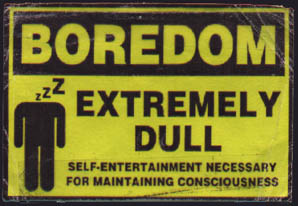
Boredom, Last Refuge of the Overstimulated

Greg:
I had one of those great "a ha"[1] moments yesterday, one where certain ideas that you've heard over and over and over again finally make sense. When it does make sense and you say it out loud, it sounds like a tautology[2], and in fact it often is, but that neither negates nor describes the impact of the realization. To wit, coming to the realization that it's not over 'til it's over seems like a tautology, and it is. But there is a deeper realization within that statement that isn't apparent from just saying it or reading it. Even though it is an empty statement, perhaps that kind of revelatory emptiness is the kind of thing that Zen[3] is all about.
Okay – so – I was getting to that moment of revelation.. I'll tell you what I think finally galvanized it. I'm reading a book by Paul Ekman, the psychologist who's famous for discovering the universality of human expression. Ekman is the one who discovered that recognition of facial emotion is not bound by culture or race, although there are certain display rules that govern what face a person can show to whom and under what circumstances. The Japanese are famous for having strict display rules. It's also interesting to note that Ekman was trying to prove precisely the opposite of what he eventually discovered. The book I'm reading is called Emotions Revealed, and it's essentially about how to get better at reading the facial expressions of others, but the real meat and taters of it is the first few chapters where he explains what emotions are and how they're triggered. For me, that's the really interesting part. As you know, I'm fascinated by emotions, specifically the emotional phenomena of empathy.
Ekman says, as I've heard before, that emotion is "a process, a particular kind of automatic appraisal influenced by our evolutionary and personal past, in which we sense that something important to our welfare is occurring, and a set of physiological changes and emotional behaviors begin to deal with the situation." I would only expand on that by saying that emotion, then, is a method for managing heuristics, each distinct emotional category containing a limited number of heuristic choices. Those choices in turn are influenced and motivated by the amplitude of the emotion. He goes on to say some really interesting things about how emotions are triggered, but first, my realization. It was this: that the present moment is inconceivably vast and peaceful; and that the present is only briefly punctuated by events. These events, the ones that we respond to emotionally, are not going on all the time. As a matter of fact, they hardly ever happen. When they do happen, they're over in a split second. What makes them seem like they're effecting us continually in the present is the fact that we ruminate on events of the past or rehearse events in the future, which may also be extrapolations of events from the past. (These ruminations and rehearsals are sometimes called worry.) It's tantamount to saying that music is mostly made up of silence, or that our physical mass is made up mostly of intermolecular space. So if it's true that the events that elicit our emotional responses are only like sparks in the unquenchable blackness of space, then these events have already come and gone by the time I've seen them happen, and since I can't do anything about anything I can't do anything about, what's the point in worrying about it?
Now it seems on the surface that it might have some survival advantage to be able to prepare oneself with appropriate responses through rumination and rehearsal. I'd say that's true to some degree, but what's more important than that is possessing the ability to respond appropriately at the moment when it's needed. What's probably most effective is to keep one's emotional amplitude low and thus keep a wide palette of heuristics ready by keeping an open mind. One way to do this is through meditation. Meditation is best practiced not as an ameliorative measure for some condition that already exists, but as a prophylaxis for things that might occur. Like the Dalai Lama says, patience is something you practice when you don't need it so that it's there when you do.
So that was my moment of revelation. To say it out loud it doesn't sound like much, and it's not like I hadn't heard it before hundreds of times. Maybe it was just the addition of the realization that "much of the time, there's nothing happening" that finally turned the crank.
I have a lot of work to do today, so I'm going to have to cut off earlier than I'd like. I'm not one to leave my correspondence and keep going back to it. It's more of something that's spontaneous and created in the moment. I think that's what makes correspondence special. It's not so spontaneous that it's completely off the cuff, yet it's not so rehearsed that it becomes disingenuous.
Cheers, and give my best to Marie,
[1] No related to that hair band from the mid–80s that sang "Take On Me".
[2] Tautology: a term used in predicate logic which describes a truth which has no content.
[3] "What is the sound of one hand clapping?" always gets credited as being a Zen koan when in fact it is not. The sound of one hand clapping is the sound of someone being slapped. 'Atsa fact. Heard it from a Zen monk.




